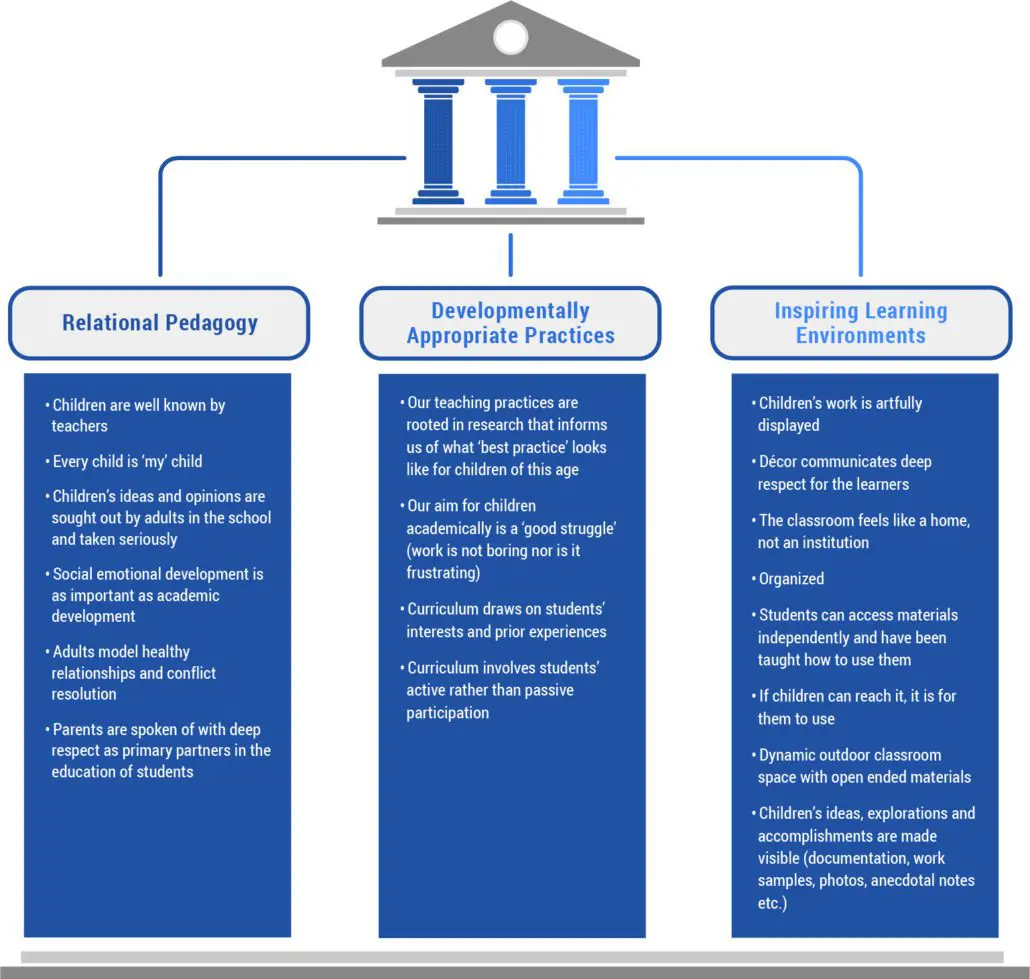Three Pillars of Academics
Home »
3 Pillars Of Academics
At Endeavor Schools we know that there is more than one pathway to rich learning. And yet, when we look at the most enduring and promising models of education, we find that each of them share 3 powerful practices. These practices are our 3 academic pillars: Relational Pedagogy, Developmentally Appropriate Practices and Inspiring Learning Environments.

Relational Pedagogy
When we refer to ‘relational pedagogy’ at Endeavor, we are pointing to our belief that positive relationships are at the heart of excellent teaching and learning. Great teachers are constantly inviting their students to engage in inquiry with them. When children and youth feel safe in a relationship with their teacher, when they feel known and trust that their teacher is ‘for them’, they are far more likely to accept that invitation. When teachers know their students well, they are able to choose the approaches that will best enable each student to access the curriculum. Indeed, in these powerful learning communities, children’s ideas and questions drive curriculum decisions made by educators.
Relational pedagogy extends to the relationships between children as well. Perhaps the most influential and precious resource children encounter at school is their peers. Excellent teachers understand the importance of children’s relationships with one another and work hard to support these friendships. These teachers build learning communities within their classrooms. They encourage children to seek support from peers rather than relying solely on the teacher. These teachers make community building a priority.
Endeavor schools are places where children, teachers and parents come together to ensure that every child thrives. For this reason, relational pedagogy is a non-negotiable for Endeavor. Before our children and youth accept our invitation to learn, they must know that we respect them, value them and are ‘for them’.
Developmentally Appropriate Practices
Developmentally appropriate practices are central to excellent education. These practices are rooted in research related to child development and best practices in education. Developmentally appropriate practice is essential for excellent teachers because at the heart of developmentally appropriate practice is the child. Our educators seek to identify the learning ‘sweet spot’ for each child; that joyful place where learning is challenging enough to not be ‘boring’ but not so challenging that it is overwhelming. We aim for our learners to be engaged in a joyful, good struggle as they work to master new knowledge and skills.
Because the children and youth we serve deserve educational practices that support their optimal growth at their phase of development, Endeavor embraces developmentally appropriate practices as a non-negotiable when it comes to our work with children and youth. We are a network of schools that engage in reflection and stand ready to embrace changes in our practice so that we can best support the growth and learning of the children and youth we serve. We seek to simultaneously harness the wisdom of a hundred years by tapping into the work of educational theorists of the past while also being informed of ongoing pedagogical research that will help us to continue developing our teacher craft knowledge so that the students in our care thrive.
Inspiring Environments
The spaces children learn in and the materials they engage with deeply impact on their learning. Learning environments set the tone for children’s work. We have high standards for our learning environments. We know how important a carefully planned, clutter free, soothing and ‘home like’ classroom is. We believe that our classrooms should be beautiful spaces that inform children and celebrate their learning. We reject the institutional feel of the classrooms that many of us learned in as children. We know that the best learning does not happen while sitting and listening to a teacher, it happens when students engage in meaningful projects or with rich materials. If classrooms are soothing places designed for children to work in small groups or independently with carefully selected materials, children are able to focus for long stretches of time. They are able to develop the ability to regulate their behavior.
Of particular importance is the utilization of the school’s outdoor space (outdoor classroom). When children are outside their brains are more fully engaged. With few exceptions, anything a child can learn inside, they will learn better outside. Research indicates that children are spending less and less time outside. This ‘nature deficit’ is resulting in increased behavior issues, depression, poor physical health and lower motivation in our children. At Endeavor, we are committed to offering our children as much access as possible to what may well be the most inspiring learning environment they encounter; the outdoors. Endeavor educators know that the learning environment matters. As such, we believe that inspiring learning environments are a non-negotiable. We want the best for our students and our teachers so we work to ensure that our classrooms and outdoor spaces are inspiring places to work and learn.
